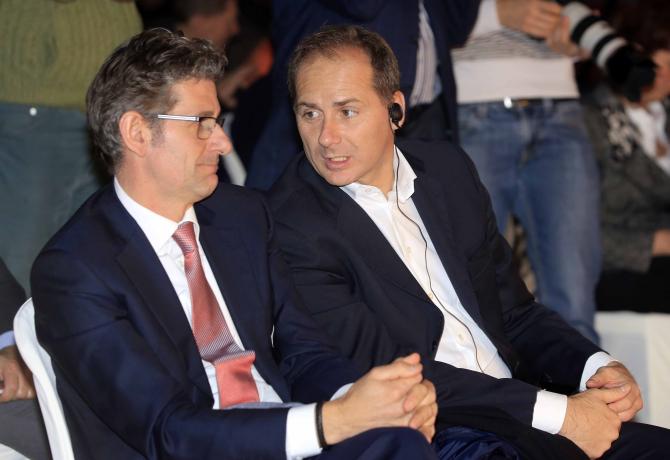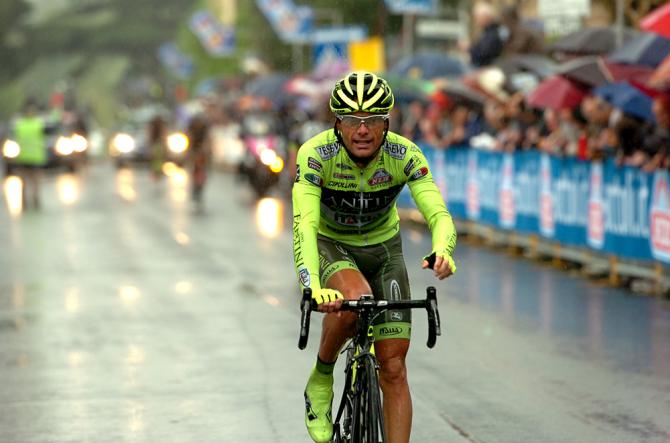Acquarone on Di Luca: How can a person of his age be so stupid?
Giro d'Italia director angry after EPO positive overshadows the Giro d'Italia


Michele Acquarone rarely loses his cool and has the natural propensity to be optimistic. However, his anger about the effects of Danilo Di Luca's positive test for EPO on the Giro d'Italia were clear to see during an afternoon press conference in Val Martello to announce that Saturday's stage will finish at the summit of Tre Cime di Lavaredo whatever the weather.
Despite bad weather disrupting the final week of the race and snow forcing RCS Sport to cancel stage 19 and redesign stage 20, Vincenzo Nibali's dominance had returned the Giro d'Italia to the front page of Gazzetta dello Sport and produced some spectacular racing that had been admired around the globe.
The news of Di Luca's positive suddenly dragged Italian cycling back into its murky past and quickly overshadowed any good feeling about the Giro d'Italia.
"It's been a very unique day in lots of ways. We hope that these 17 great days of the Giro aren’t cancelled by snow or by the mud," Acquarone said, making it clear who he was referring to.
"In our hearts we've got the warmth of Naples and the sun of Ischia. It's been a spectacular Giro with lots of people along the roadside and watching at home. The snow won't cancel the Galibier stage and the finishes at Ivrea and Vicenza.
"Regarding the mud, we can only say that every time it happens we feel we're a victim but we won’t allow a single case to damage a new cycling generation of clean riders. I'm not trying to minimize things but I think it's a case of an old rider who hasn't understood that the world has changed."
Acquarone's anger was evident as soon as Di Luca's name was mentioned.
Get The Leadout Newsletter
The latest race content, interviews, features, reviews and expert buying guides, direct to your inbox!
"I'm angry because I think: 'How can a rider or a person of his age be so stupid and not understand that the music has changed and not understand the damage he's doing to himself and the whole movement'," Acquarone said.
"I really hope it's a marginal event, but it means were not talking about Nibali's great win yesterday and so [Di Luca] has caused some damage. We're not talking about what we should be talking about."
Di Luca's Vini Fantini-Selle Italia team is not part of the UCI WorldTour and so was invited to the Giro d'Italia by RCS Sport as a wild card team. Di Luca was not part of the team when Vini Fantini was given the wild card, but it was widely expected that he would join the team. Acquarone has no regrets about the decision to include the team, suggesting Di Luca needs help because he has a drug problem.
"The Vini Fantini team is a great expression of Italian cycling," he said.
"It has some great campione in its team; riders such as Garzelli, who wanted to end his career at the Giro, Rabottini, who won the climber's blue jersey last year, Oscar Gatto who won a beautiful Tropea ahead of Contador. When the commission decided to give Vini Fantini a wild card, it was because we've got to support Italian cycling.
"Speaking personally, if someone looks me in the eyes and he tells me 'I made a mistake, I've understood and won't make another mistake' I believe them. When he makes another mistake, it means he's got a drug problem. If he can’t stop himself, he definitely needs help."
Experienced Giro d'Italia technical director Mauro Vegni refuted the suggestion that RSC Sport should have been suspicious of Di Luca's performances after his successful but very late comeback to racing.
"It's not up to us to evaluate a rider's performances. I think it's up to the team, not the organisers," Vegni said.
"He's got a licence from the international federation and so that's OK for us. He undergoes all the controls, like all the riders. He got caught by one of them. I don’t see why we should evaluate his performances.
It's time to stabilise the sport
Acquarone and Vegni hinted they will consider legal action against Di Luca after the Giro d'Italia is over. They also want to continue to work with the teams to create a new, more stable structure for the sport, so riders are less tempted to dope.
Acquarone has held talks with the Association International des Groupes Cyclistes Professionels (AIGCP) and offered a revenue-sharing structure. The teams have so far refused a long-term deal but talks are on going and Acquarone met with new AIGCP president Luuc Eisenga this week.
"We're willing to work with the teams and the UCI to make teams more stable, so that so we talk about internal controls and help the teams to help defends themselves and so focus less on individual riders," Acquarone revealed.
"I really think there's a desire to change and there's a desire to work with Luuc Eisenga to find whatever is needed to make sure these cases don’t happen again. I think cycling is changing. It's going in the right direction and a lot is being done. One isolated case of an old rider won't change our strategy."
Mauro Vegni suggested that any reforms should include a change in the international calendar.
"I think that the reforms the UCI is carrying out will be important in this sense. We need to change the world calendar. There are probably too many races, too many races close to each other and above all, the globalization of cycling and addition of new races in new cycling countries, obliges us to review the calendar and the rules that decide it. It's fundamental and decisive for the future of the sport."

Stephen is one of the most experienced member of the Cyclingnews team, having reported on professional cycling since 1994. He has been Head of News at Cyclingnews since 2022, before which he held the position of European editor since 2012 and previously worked for Reuters, Shift Active Media, and CyclingWeekly, among other publications.